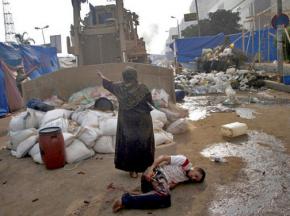Standing up for democratic rights in Egypt
reports on the calls for democracy raised inside and outside Egypt.
THE DEATH toll from clashes in Cairo and Giza on the third anniversary of the revolution that overthrew hated dictator Hosni Mubarak has climbed to 64, according to Egyptian officials, but the government's harsh treatment of street protests is merely one element of the military's drive to crush dissent.
Autopsies of the fallen protesters show that at least 58 of the deaths were attributable to the use of live ammunition by police seeking to disperse the January 25 demonstrations. The use of snipers, tear gas and riot police against protesters has become routine as the military regime headed by Gen. Abdul-Fattah el-Sisi continues rebuilding the repressive means at its command.
In response, an ad hoc coalition of prominent journalists, public intellectuals, human rights groups and activist formations have joined forces to call on the Egyptian government to respect the basic democratic rights that millions of Egyptians fought for during the 2011 revolution.
A January 23 report by Amnesty International puts the use of lethal violence by Egyptian police against street protests in the larger context of government repression aimed at all those who dare to criticize the regime.

Hassiba Hadj Sahraoui, deputy director of the Middle East and North Africa Program at Amnesty, called on "authorities [to] loosen their stranglehold on civil society and allow peaceful protests and other avenues for lawful dissent" and described the government's assault on basic democratic rights as a "betrayal of all the aspirations for bread, freedom and social justice" of the Egyptian Revolution. He continued:
Egypt has witnessed a series of damaging blows to human rights and state violence on an unprecedented scale over the last seven months. Three years on, the demands of the "January 25 Revolution" for dignity and human rights seem further away than ever. Several of its architects are behind bars, and repression and impunity are the order of the day.
With such measures in place, Egypt is headed firmly down the path towards further repression and confrontation. Unless the authorities change course and take concrete steps to show they respect human rights and the rule of law, starting with the immediate and unconditional release of prisoners of conscience, Egypt is likely to find its jails packed with unlawfully detained prisoners and its morgues and hospitals with yet more victims of arbitrary and abusive force by its police.
Egypt's police and security forces have carried out crackdowns on university campuses, sentenced leading revolutionary activists to prison for failing to comply with new laws banning protests without police permission, filed criminal charges against activists peacefully campaigning in mid-January for a "no" vote on the constitutional referendum, and targeted journalists with live ammunition and arrest for covering protests.
According to the Amnesty report:
Since July 3, 2013 [the day that the military deposed former President Mohamed Morsi of the Muslim Brotherhood], 1,400 people have been killed in political violence, most of them due to excessive force used by security forces. No proper investigation has been carried out into the deaths of more than 500 Morsi supporters when excessive force was used to disperse a sit-in at Rabaa al-Adawiya in August 2013. Not a single member of the security forces has been charged in connection with the incident, which was a callous bloodbath on an unprecedented scale.
EGYPTIAN NOVELIST and political commentator Ahdaf Soueif is adding her voice to the small but significant forces speaking out in opposition to the government's sweeping crackdown.
Writing in Britain's Guardian newspaper, she noted that Egyptian voters between the ages of 18 and 40 largely stayed away from the mid-January referendum on the constitution:
Egypt's 31 million 18- to 40-year-olds were conspicuously absent from the queues waiting to tick the blue circle. They make up 60 percent of the electorate, but they seem to have been a much smaller percentage of the turnout.
The interim government and General Abdul-Fattah el-Sisi, its unofficial leader, are concerned enough to try to sweet-talk them by inviting them to dialogue. But the young don't want to talk; they want to run their country and their lives themselves. As one group put it: "These old people are inflating their pensions with our futures." Young people's answers explaining why they didn't take part in the referendum included: "because we're all in jail"; "because we're preparing the new revolution"; and "because your constitution is soaked in blood."
But as Soueif noted, the revolutionaries of the younger generation no longer enjoy the support of a current that was crucial to the success of the 2011 revolution--the liberal intelligentsia:
The dispiriting thing is the massive swath of the older political liberal, nationalist elite, the writers and artists and cultural figures with a history of struggle against Mubarak, who were part of the revolution in January and who are now unequivocally on the side with the generals--first against the Brotherhood, now against the revolution itself.
Given this betrayal on the one hand and the urgency of defending democratic rights on the other, Egyptians are calling for an international campaign of solidarity with the revolution to pressure the Egyptian government to back away from its embrace of authoritarian rule.
In the works are plans for a petition demanding the release of activists detained for exercising the right to free speech and peaceful protest--and a day of solidarity demonstrations outside Egyptian consulates and embassies on February 11, the third anniversary of the day that Mubarak was ousted.
Those struggling to keep the hopes of the revolution alive in Egypt deserve all our support. Please circulate the petition and start planning a February 11 solidarity protest in your city now.


